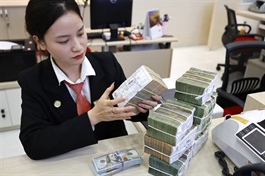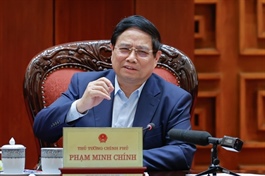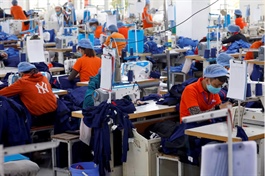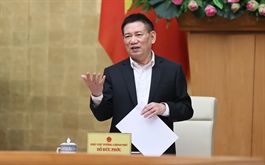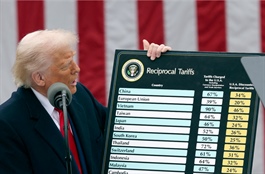Robust market could pull in fund appetites
Robust market could pull in fund appetites
The nations’ capital market can offer a wide range of opportunities for both local and foreign financial backers, particularly investment funds.
At the event in Ho Chi Minh City, themed on funds and investment from overseas in Vietnam’s new development era, Asian Development Bank (ADB) country director for Vietnam Shantanu Chakraborty said the country’s market is diverse and growing, from equities and bonds to derivatives and mutual funds.
“As has been the experience in other parts of developing Asia, robust bond and money markets will be important to attract investment funds with appetites for fixed income and liquid instruments like sovereign and corporate bonds, certificates of deposits, or preferred shares,” said Chakraborty.
According to the ADB, Vietnam has significant potential in its bond market. Total outstanding bonds in Vietnam currently account for just over 30 per cent of GDP, compared with total bank credit of over 120 per cent. There is a much greater role the bond market and income funds can play in mobilising both public and private capital to finance the country’s growth, Chakraborty added.
However, Vietnam is highly vulnerable to natural disasters and extreme weather due to its extensive coastline, river deltas, and highlands.
“To protect the vulnerable and support economic development, it is estimated that the country would require additional investments of about 6.8 per cent of its GDP, or a cumulative $368 billion through 2040, to ensure the country’s resilience,” explained Chakraborty.
Don Lam, CEO and founding partner of VinaCapital, said that investment funds in Vietnam were currently developing rapidly, but the current stock market has too many small-scale investors who lack sufficient knowledge, and so face many risks.
“They should invest through professional funds. Developing such funds in the Vietnamese market will help it develop in a more stable manner because they will do business in the long term and invest strategically,” Lam said.
He suggested that some major funds Vietnam should develop include voluntary pension, sovereign, and infrastructure funds; a real estate investment trust; strategic exchange-traded funds; and a green development fund.
“Proposed solutions issuing personal financial management handbooks to educate individual investors, especially on risks in direct securities funding, and developing a national online portal for investors in open-ended funds,” Lam added.
In addition, other essential works Vietnam should carry out to increase the credit market include public fund information and performance rankings, enhancing the personnel and tech capabilities of regulatory agencies, and using AI and big data to detect unusual transactions.
“Furthermore, Vietnam must quickly adopt International Financial Reporting Standards to enhance transparency, and work with international credit rating agencies on measures to achieve investment grade in sovereign ratings,” he added.
Minh Do, country director at Warburg Pincus, said that improving the investment environment through policies that loosen foreign ownership limits (FOLs), improve initial public offering (IPO) conditions, and utilise financial development will help Vietnam become more attractive to international financiers.
“To support startups companies in fintech, we suggest that Vietnam loosens requirements so that those companies can mobilise and raise capital on the stock market, which would contribute towards their development in Vietnam,” Do said.
Some key suggestions include loosening of FOLs, particularly in the banking sector, and creating clearer options for exit paths, including IPOs.
With a maximum 30 per cent FOL in a commercial bank, Vietnam has one of the lowest limits in the region, far behind peers like India, Indonesia, Thailand, and Singapore.
“While we believe Vietnam’s banking sector has the potential to repeat the impressive growth trajectories of more financially developed regional peers, we think bringing Vietnam’s FOLs to be more in line with the region is an important step towards achieving this goal,” he said.
He added that even an increase to around 50 per cent would be a game changer, yet still below other regional markets. “We fully understand concerns around foreign banks becoming large and influential shareholders in a key economic sector such as banking, which could have implications for Vietnam’s sovereignty. However, we believe these concerns are much less applicable to financial investors, and therefore we would recommend increasing the FOL applied to strategic and financial ones,” he added.
Do of Warburg Pincus strongly encouraged the government to integrate a clear and phased roadmap for FOL relaxation into Vietnam’s broader financial market development strategy.
“This approach would not only accelerate the stock market’s upgrade but also reinforce the country’s ambition to develop financial centres, aligning with international best practices,” he said.
|
Nguyen Van Thang, Minister of Finance Investments funds in Vietnam remain underdeveloped relative to its potential. By the end of 2024, the total net asset value of securities investment funds accounted for just 1.2 per cent of stock market capitalisation, while assets under management by fund management companies represented only 3.4 per cent of the banking sector’s total assets. Although the number of investors in the stock market continues to expand, foreign investor trading accounts make up only 0.5 per cent of the total, highlighting the need for further development in this area. While foreign capital inflows have shown strong momentum, international investors continue to face regulatory challenges. Key concerns include procedural bottlenecks related to land use, construction, taxation, customs, administrative processes, and foreign exchange regulations. Addressing these issues is essential to sustaining confidence and maintaining Vietnam’s competitiveness in the global investment landscape. |
- 15:52 04/04/2025



